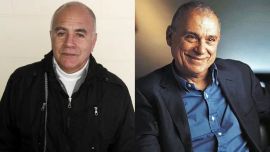Reaching consensus on restrictions with other governments and leaders, but at the same time addressing the portion of his own electorate which will not accept new lockdown. Following with concern the evolution of positive cases and the occupancy of beds in intensive care units, while making individual responsibility his banner. Sitting down with President Alberto Fernández after being docked federal revenue-sharing funds but settling for claiming a better distribution of vaccines, given the higher percentage of doctors and the elderly living in the Federal Capital. Co-existing with the hardline wing of the Juntos por el Cambio coalition, which without any governmental responsibilities of its own is free to criticise the government for every blunder, while stressing the need for unity. Horacio Rodríguez Larreta is caught inside a labyrinth, one from which he seeks to emerge with a key premise intact: he must not to abandon his moderate stances.
In both his relationship with the national government and his Juntos por el Cambio party colleagues, the Buenos Aires City mayor is at a crossroads where every decision is linked to his presidential aspirations. At City Hall’s Uspallata headquarters they keep talking of moderation and “breaking through la grieta,” Argentina’s persistent rift of polarisation, as their main recipe. Nevertheless, all concerned have already understood the need to send increasingly strong signals to counter the predominance of the hawks in public debate.
“Before they mocked and ignored [opposition PRO party leader] Patricia [Bullrich] and now they’re worried.. In our most recent conversation Horacio mentioned her to me five times, saying that she’s not a problem and that it’s good to have tougher sectors. But it’s now clear that she needs to be taken into consideration,” says one PRO leader, speaking on the condition of anonymity.
In Rodríguez Larreta’s entourage they deny that Bullrich’s rise in both national prominence and the polls concerns them. Some even analyse it as something positive arguing it could boost the possibility of a Juntos por el Cambio PASO primary in the City, thus drawing in more interest. But others have their doubts, visualising another dilemma: if there are primaries and the hardline sector wins, it would be a blow to Rodríguez Larreta’s leadership ambitions. If Bullrich heads a unity list and wins big, that would also boost her own presidential aspirations.
“Moderation continues to pay off,” the City Mayor tells his entourage, citing opinion polls in which ex-Buenos Aires Province governor María Eugenia Vidal, Senator Martín Lousteau and former economy minister Roberto Lavagna are the only leaders apart from himself with a positive image outweighing the negative.
Rodríguez Larreta cites the example of Alberto Fernández, arguing he “polled 80 percent when he was seen as moderate and fell to 30 percent when he went radical.”
Those close to Patricia Bullrich refer to opinion polls showing her on the rise and the mayor on a downward trend. “Horacio is on the decline if not as steep as Alberto, from 70 to 50 percent. She‘s on the rise,” said one insider, who dodged the question of the ex-security minister’s presidential hopes. “Bringing forward the 2023 election to 2021 would be a huge error,” they added.
Meanwhile, the mayor still has to fine-tune his links with Mauricio Macri.
“Logically enough, the relationship is not the same, we don’t have the daily dynamic we had in City Hall, while the pandemic has left us a long time without seeing each other,” Rodríguez Larreta has told those closest to him.
The former president is working on his own comeback to strengthen his internal leadership of the opposition coalition.
“He wants to draw up his own lists,” says one leader close to Macri, who is on good terms with all sectors. Only around 10 of the current 50 PRO deputies are “his.”
Macri is not only pushing Bullrich to compete in the primaries but he is also calling up leaders in Buenos Aires Province, where Vicente López Mayor Jorge Macri has sealed a deal with Bullrich to head off City Deputy Mayor Diego Santilli – if Vidal decides not to run.
“I’ve no doubt that at the end of the day he will end up backing Horacio but today he is looking for more strength and using Patricia to that end,” analyses the leader close to Macri. Meanwhile Rodríguez Larreta stays conciliatory and downplays the situation every time he is consulted.
“I don’t want to be the leader of our space, I want to be president of this nation,” he responded to one group of leaders recently.
The balancing act extends beyond his allies to the national government.
“For anything which has to do with health, we’ll be ready to converse,” they explain in City Hall, speaking prior to this week’s dramas. After successive disagreements the mayor feels obliged to keep fostering dialogue to prevent fresh confrontations from panning out into bigger problems. The fall in the presidential image, in tune with the flaws being shown by the national administration, has allowed City Hall to differentiate itself yet further.
A new front has opened up too, from an unusual source. Máximo Kirchner is proposing that the opposition’s potential presidential candidates should jointly support the Peronist government’s negotiations with the International Monetary Fund over its US$44-billion debt.
“First they should show what their proposal is, how they’re going to pay, even if it’s over the course of 20 years. They deny among themselves that there are conversations in progress and those negotiations should be shared with the parties in any case. The economy from here on to 2023 can only get worse,” said one City Hall insider.
In recent times Uspallata has begun to pay more attention to Patricia Bullrich, which has only further strengthened her wing of hardliners. But Rodríguez Larreta insists on a path of moderation – and he thinks it can take him to the Casa Rosada.


























Comments